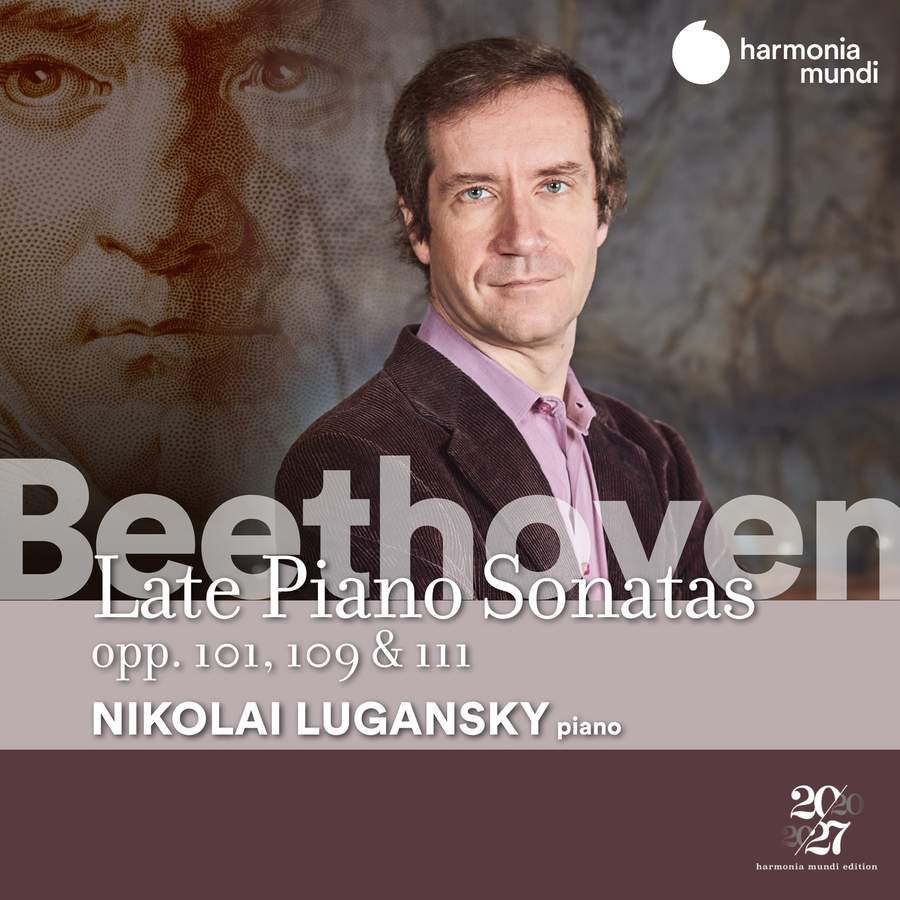BEETHOVEN Piano Sonatas Opp 101, 109 & 111 (Nikolai Lugansky)
View record and artist detailsRecord and Artist Details
Genre:
Instrumental
Label: Harmonia Mundi
Magazine Review Date: 01/2021
Media Format: CD or Download
Media Runtime: 69
Mastering:
DDD
Catalogue Number: HMM90 2441

Tracks:
| Composition | Artist Credit |
|---|---|
| Sonata for Piano No. 28 |
Ludwig van Beethoven, Composer
Nikolai Lugansky, Piano |
| Sonata for Piano No. 30 |
Ludwig van Beethoven, Composer
Nikolai Lugansky, Piano |
| Sonata for Piano No. 32 |
Ludwig van Beethoven, Composer
Nikolai Lugansky, Piano |
Author: Harriet Smith
It has been a good few years since Nikolai Lugansky last released any Beethoven and he avoids the usual last three by replacing Op 110 with Op 101.
Context is all, and these arrived hard on the heels of the Barenboim complete set recorded in lockdown. By comparison I much enjoyed the physicality and inner steeliness of Lugansky’s playing, which comes to the fore in a movement such as the second of Op 101, where he revels in the contrast between the violent march rhythms and the guileless imitative inner section. To the opening movement of the same sonata he brings soul and a freshness of narrative that is also very engaging. The key to the slow movement is to create a sense of the epic even within its relatively modest dimensions; Lugansky is relatively slow here, certainly compared with Steven Osborne and Richard Goode, both of whom meld the lines more naturally. Lugansky’s finale, though, is full of brilliance and determination (a relief after the limp reading from Barenboim), though he somewhat short-changes the playful asides, which Osborne in particular conveys wonderfully.
If Op 101 is largely successful, I have reservations about the other two sonatas – this, of course, is a matter of taste, and there’s no doubting the quality of the pianism here. Though the brief second-movement Prestissimo of Op 109 is full of drama, even the whispered moments retaining a sense of stress, I found the opening of the sonata a tad mannered, the different elements set in contrast rather than forming a coherent whole, as exemplified by Uchida. And the theme that launches the extended variation-form finale sounds too slow and a touch ponderous, especially when compared with the simplicity of Uchida. This carries on through the variations, with the octaves of Var 3 and the fugal writing of Var 5 somewhat strenuous, particularly compared to Goode. In the final extended variation Lugansky’s trills are a little too fierce for my taste, but the reminiscence of the main theme is touching.
The opening Maestoso of Op 111 tells much about a pianist’s take on the work. I’ve never got on with Uchida’s extreme world-weariness, which feels too resigned. Lugansky is at the opposite extreme, filled with a blatant fury, but each phrase feels unrelated to what is around it, whereas the greatest proponents reveal a sense of line, even through the rests. As he moves into the Allegro proper there’s no shortage of energy but the ferocity becomes somewhat wearing; the fugal writing (from 5'43") is relentless, whereas other pianists (Osborne, Goode) find a grim playfulness that offers temporary respite. The Arietta comes as a relief but as the variations progress it doesn’t move as some can. Perhaps it’s down to a shortage of real delicacy in the highest-lying writing, or maybe it’s the lack of vulnerability and the feeling that Lugansky is ultimately unassailable.
Discover the world's largest classical music catalogue with Presto Music.

Gramophone Digital Club
- Digital Edition
- Digital Archive
- Reviews Database
- Full website access
From £8.75 / month
Subscribe
Gramophone Full Club
- Print Edition
- Digital Edition
- Digital Archive
- Reviews Database
- Full website access
From £11.00 / month
Subscribe
If you are a library, university or other organisation that would be interested in an institutional subscription to Gramophone please click here for further information.




